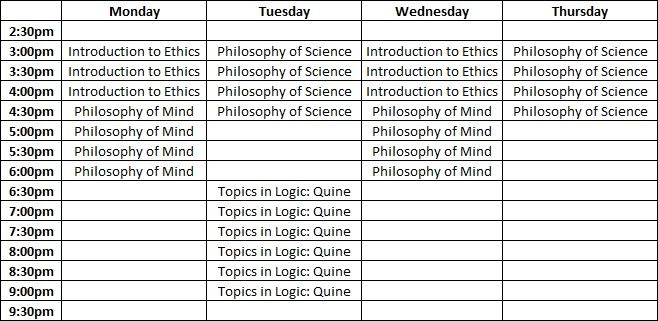(Updated) Spring 2011 Class Schedule

Philosophy 024 / “Introduction to Ethics” (TEACHING ASSISTANT)
David Denby / Monday, Wednesday 3:00-4:15
After a brief introductory discussion of logic and the nature of ethical theory we will spend most of the semester critically evaluating a number of normative ethical theories. These will include various forms of Relativism, religiously-based theories, Utilitarianism, Kantianism, Egoism and Social Contract theories. We will also discuss self-interest, values, and other matters. Finally, we will discuss how to apply what we've learned to issues of contemporary moral concern.
Philosophy 117 / “Philosophy of Mind”
Stephen White / Monday, Wednesday 4:30-5:45
This course will focus on the nature of conscious experience, its relation to the subjective point of view, and the implications of both for the mind-body problem, the problem of agency, and the problem of other minds. The traditional mind-body problem has been taken to raise such questions as whether we could continue to exist after our bodies had been destroyed and whether computers could be conscious. We will consider these questions, but we will also consider carefully the nature of the subjective point of view and the question what is involved in seeing a world that contains opportunities for genuine action, states of affairs worth striving for, and agents like ourselves.
Philosophy 116 / “Philosophy of Science”
George Smith / Tuesday, Thursday 3:00-4:15
An examination of central philosophical problems concerning scientific method and scientific knowledge, such as: How is theory related to observation, or prediction to explanation? How can we justify the scientific method, induction, and our notions of space and time? Do scientific theories and methods impose a structure on the world, or do they tell us about the way the world really is?
Philosophy 114 / “Topics in Logic: Quine from Early to Late” (AUDITING)
Jody Azzouni / George Smith / Tuesday 6:30-9:00
Some philosophers continue to focus for their entire philosophical lives on the same issue or a very small number of issues that were the first to catch their attention and draw them into professional philosophy. This was certainly true of Quine whose very first extant writing, some lectures on Carnap, centered on the nature of the a priori, a topic to which he returned again and again for next the sixty years. Students rarely have the opportunity in their course work to see how a position a philosopher adopts early in his or her career evolves over time as they think increasingly deeply about it. This course will enable students to do this, specifically for Quine and his lifelong preoccupation with what to say about a priori truth and the epistemology of logic.